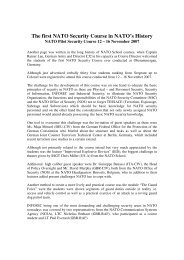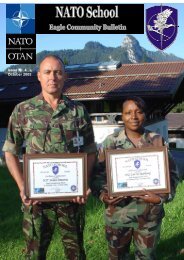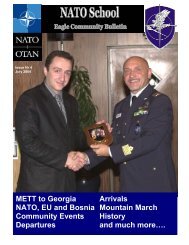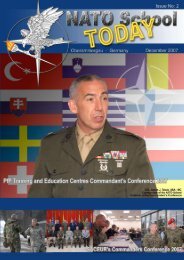Issue Nr. 1 March 2006 - NATO School
Issue Nr. 1 March 2006 - NATO School
Issue Nr. 1 March 2006 - NATO School
You also want an ePaper? Increase the reach of your titles
YUMPU automatically turns print PDFs into web optimized ePapers that Google loves.
<strong>NATO</strong> <strong>School</strong><br />
Community Bulletin <strong>March</strong> <strong>2006</strong> Edition<br />
ISAF Deployment<br />
by Major Sarah Scullion<br />
I deployed to Afghanistan at the request of JWC in<br />
support of the JALLC to participate in a team<br />
study conducted Oct-Nov 2005. This team<br />
comprised members of France, Italy, Norway,<br />
United Kingdom and the United States. The Joint<br />
Analysis Lessons Learned Centre (JALLC) was<br />
tasked to analyze the relief-in-place of a US<br />
Provisional Reconstruction Team (either under<br />
<strong>NATO</strong> control or just prior to <strong>NATO</strong> assuming<br />
control of the PRT) to another <strong>NATO</strong> or non-<br />
<strong>NATO</strong> relieving nation and thereby identify<br />
lessons to improve the transition process.<br />
We traveled to Kabul, Farah and Herat within<br />
Afghanistan. Central and regional headquarters<br />
were visited, as well as two Provisional<br />
Reconstruction Teams, Non Governmental<br />
Organization offices, reconstruction worksites in<br />
the civilian communities, and a Forward Support<br />
Base. Our report was issued 31 Jan 06 and is<br />
classified as <strong>NATO</strong> Confidential Releasable to<br />
ISAF. Key recommendations were in the areas of<br />
doctrine, organization, training, material, facilities<br />
and interoperability. The lessons-learned report is<br />
intended to facilitate and improve <strong>NATO</strong>’s<br />
involvement in ISAF’s Stage 3 expansion.<br />
Learning English with the Flying Cow<br />
By Mandy Payne<br />
Sixteen <strong>NATO</strong> <strong>School</strong> wives are taking part in a<br />
unique trial of a remarkable English language<br />
learning software programme.<br />
The ladies, who between them come from thirteen<br />
different European countries, among them<br />
France, Spain, Poland and Lithuania, are all<br />
working daily at fun computer games featuring<br />
flying cows and talking turtles. While they are<br />
clicking at the animals, they are being subtly<br />
trained in the skills needed to learn and improve<br />
their English – how to discriminate between<br />
similar sounds, such as “d” and “t”, for instance,<br />
and how to remember and follow increasingly<br />
complex spoken instructions. The software, which<br />
is widely used in the US but is relatively new to<br />
Europe, appears to develop the human brain’s<br />
language learning centres in a way that makes it<br />
easier to absorb the English language. The<br />
American company that developed the products<br />
has agreed to make this normally expensive<br />
course available to these ladies free of charge for<br />
the purposes of the trial, and we are grateful to<br />
the <strong>NATO</strong> <strong>School</strong> for generously covering the<br />
trial’s running costs. Speech therapist Catherine<br />
Ruckert, who practises in Starnberg and who has<br />
been using the software successfully with her<br />
clients in recent years, is giving up her own time<br />
to analyse the data and manage the trial.<br />
The <strong>NATO</strong> <strong>School</strong> currently employs personnel<br />
from 23 different countries, many of whom arrive<br />
here with wives and children who speak neither<br />
German nor English. Can you imagine coming to<br />
Oberammergau knowing that there will be not one<br />
person outside the family that you can talk to in<br />
your own language? Families can face an uphill<br />
struggle to learn enough German or English to be<br />
able to make friends and enjoy life as part of the<br />
<strong>NATO</strong> community. While kids learn quickly, adults<br />
who’ve had little exposure to English can find the<br />
language almost impossible. This is why<br />
European wives deserve all the support we can<br />
give them. The software training will, we hope,<br />
shorten the learning curve substantially – it is<br />
claimed to achieve around a year’s progress in<br />
English in the space of a few weeks.<br />
The trial began at the end of January, and into its<br />
second week it’s already generating plenty of<br />
discussion. It is expected to continue until April,<br />
after which the results will be published. Please<br />
give your support by taking a moment to have a<br />
chat with any <strong>NATO</strong> <strong>School</strong> English learners and<br />
give them a bit of practice!








